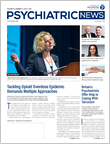The APA community is facing challenging uncertainty about the future of health care in the rapidly changing practice environment. Community psychiatry serves a central function to provide services in settings that enable individuals to live productive lives and is the structural support that can prevent unnecessary and costly health care services.
At a time when there are more questions than answers regarding health care reform, the call for collective impact and engagement has never been louder. Many of you have felt a strong desire to connect with colleagues and take advantage of opportunities to discuss substantive issues that impact our communities. As vice chair of the Scientific Program Committee for IPS: The Mental Health Services Conference, I can assure you that this year’s conference (October 19 to 22) will educate, equip, and inspire you to action. The conference, whose theme is “Enhancing Access and Effective Care,” promises to deliver an enriched experience that will rejuvenate as well as educate you. If you have never attended the IPS or have been away for a few years, I want to highlight a few aspects of our program that I am particularly excited about.
•
Stepping Outside the Clinic. What happens when you take community psychiatry to the actual community? When community traumatic events emerge from a setting of chronic adversity and disadvantage, psychiatrists can lead within the community with impactful contributions as partners with other stakeholders.
The presentation by Deborah Blalock, M.D., “Tragedy in the Sanctuary: The Charleston Community’s Response to the Emanuel A.M.E. Massacre,” addresses the unfortunate reality of racism and violence in many communities. As many of them suffer from woefully inadequate and underfunded psychiatric services, psychiatrists are again summoned to act outside the clinic walls as advocates for mental health equity. Joe Parks, M.D., will lead the workshop “Addressing the Problem of Access to Psychiatric Services,” which will stimulate your thinking about ways to address access to care. These sessions speak to the role of psychiatrists in community settings as advocates, change agents, and leaders.
•
Tackling Hot Topics. We won’t be debating climate change at the IPS, but two sessions involve this important issue from the perspective of mental and population health. These sessions are not to be missed: the symposium led by David Pollack, M.D., “Climate Change: The Ultimate Social Determinant of Health and Mental Health” and the workshop led by Elizabeth Haase, M.D., “Sickly Hot: Clinical Consequences of Climate and How to Protect Your Patient.”
•
Networking for Introverts. If you have never attended IPS or have not attended in a few years, you should know that one of the best aspects of this conference is the opportunity to meet with other psychiatrists in an intimate setting conducive to networking. You’ll have plenty of opportunities to speak with presenters and participate in small group discussions. Medical students and residents have many opportunities to meet prominent thought leaders in community psychiatry, both after presentations and at other events. Finding like-minded psychiatrists who are concerned about the social determinants of health and advocate to change the systems and structures undermining access to care is a unique opportunity that IPS provides. If you are a bit intimidated at the thought of networking at large meetings, IPS is the ideal conference to meet people who could become part of a lasting network of colleagues, mentors, and fellow change agents.
Finally, there’s no doubt that the Big Easy has much to offer with its historic charm, exciting culture, and culinary delights. I hope you are as excited as I am to attend these and other sessions while making new connections and have decided to join us in New Orleans! ■

